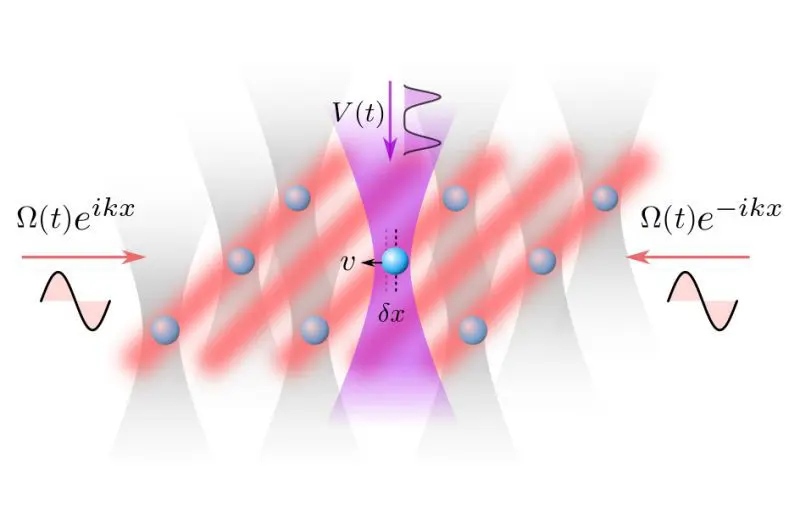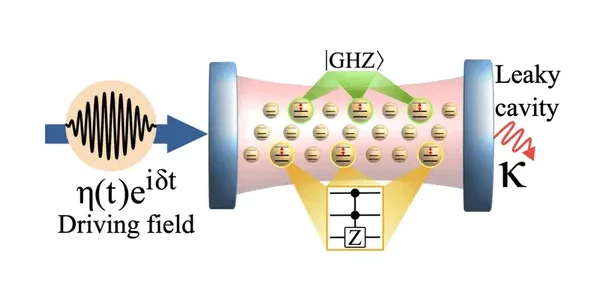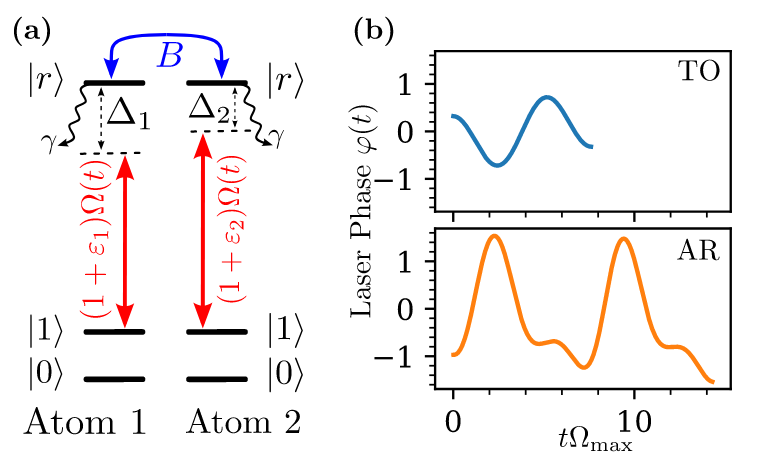By QPerfect
July 22, 2025
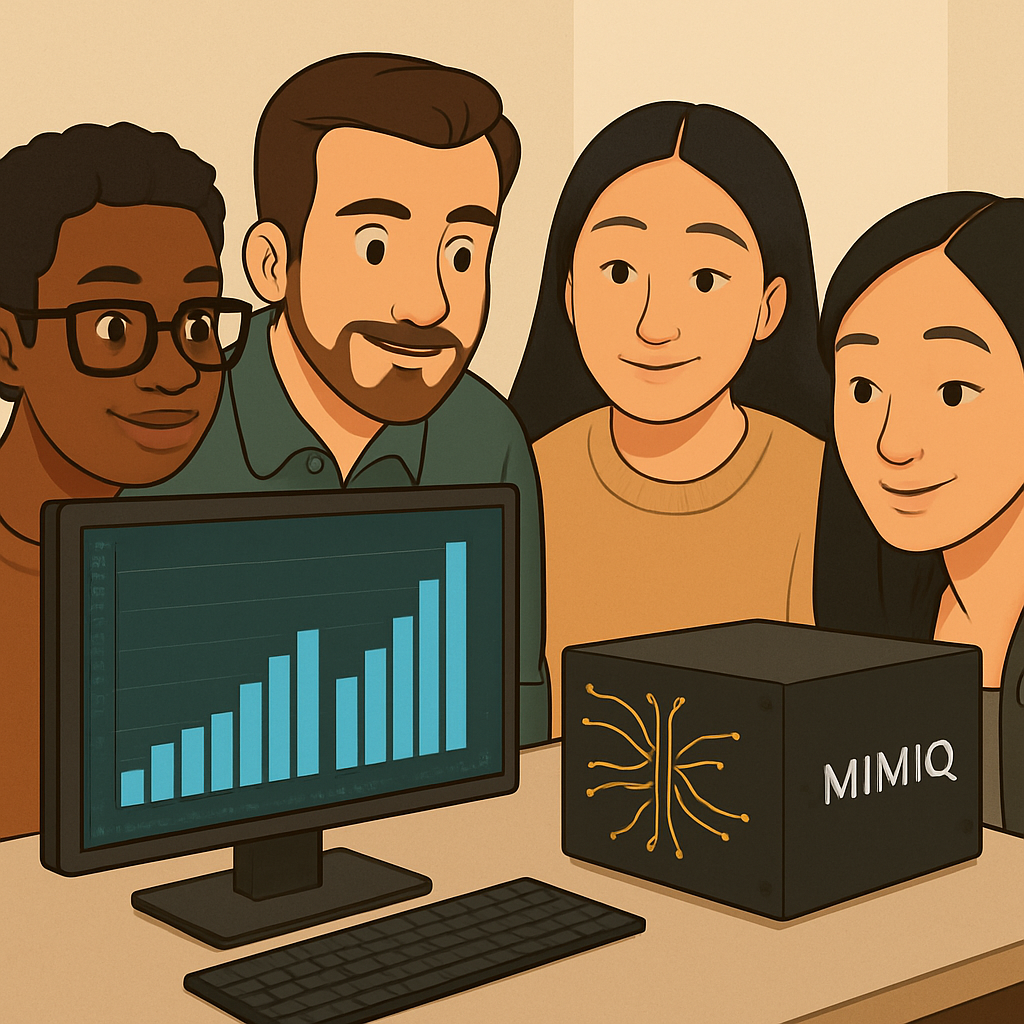
QPerfect recently participated in a quantum emulator benchmarking challenge organized by Quantinuum, a leading full-stack quantum computing company that uses emulation extensively in their R&D.
The result? — Our own emulator, MIMIQ, crushed it.
This challenge was designed to identify the best quantum circuit simulators for their research teams to use. While tensor network methods allow to simulate quantum circuits at scales well beyond what is possible with statevector simulators, their limits are still relatively unexplored (see our own recent benchmarking paper where we demonstrate how powerful tensor networks really are). To address this point, Quantinuum asked their research teams to provide a set of application-oriented benchmark circuits, with varying difficulty levels, from 28 to 280 qubits and from 71 to more than 1 million multiqubit gates. The study was designed to help identify collaborators and to potentially integrate their solutions into the Quantinuum software stack.
You can view the official benchmark report published by Quantinuum for more details. https://github.com/CQCL/public_tn_sim_challenge_results
.
Benchmark design
The benchmark study covered a broad spectrum of use cases of relevance to Quantinuum’s research efforts, including:
- Trotterized Hamiltonian simulations
- UCCSD ansatz state preparation for chemistry
- Multivariate state preparations
- Quantum Monte Carlo integration
- Quantum error correction codes
The circuits were sorted into four categories: easy, medium, hard, and impossible. Difficulty levels were assigned by Quantinuum based on their experience, depending not only on qubit number and circuit depth, but also on the complexity of the state created (for example, the amount of entanglement).
The goal of the challenge was to run each circuit as fast as possible within certain accuracy bands. Each participant was free to use the best method, hardware, and optimizations possible. To ensure validity of the results, participants were asked to calculate some observables and provide a certain minimum fidelity.
Results
QPerfect took part in the public tier with our quantum emulator, MIMIQ, alongside three other emulators: pytket-mps (Quantinuum), QuantumRings, and QMatchaTea. More emulators participated but decided to keep their results private.
We’re excited to share that MIMIQ had the fastest runtimes on almost all the challenge circuits, often 10 to 100 times faster than the others! MIMIQ was even able to solve some of the circuits in the impossible category.
Figure 1 shows a summary of the runtime results for some of the above categories. The circuits are ordered in increasing order of complexity, approximately. The only area we didn’t enter was the UCCSD chemistry circuits, as we will soon release a new optimization strategy for those types of circuits.
Notably, MIMIQ was the only submission running solely on CPUs (for now), demonstrating that a well-optimized CPU-based emulator can outperform even the best GPU-based emulators for many tasks. Even the Quantinuum team was surprised by MIMIQ’s performance!
“MIMIQ is an impressively fast tensor network simulator that has pushed the boundaries of what I thought could be efficiently simulated on CPUs.”
— Pablo Andres-Martinez, Sr. R&D Scientist, Quantinuum
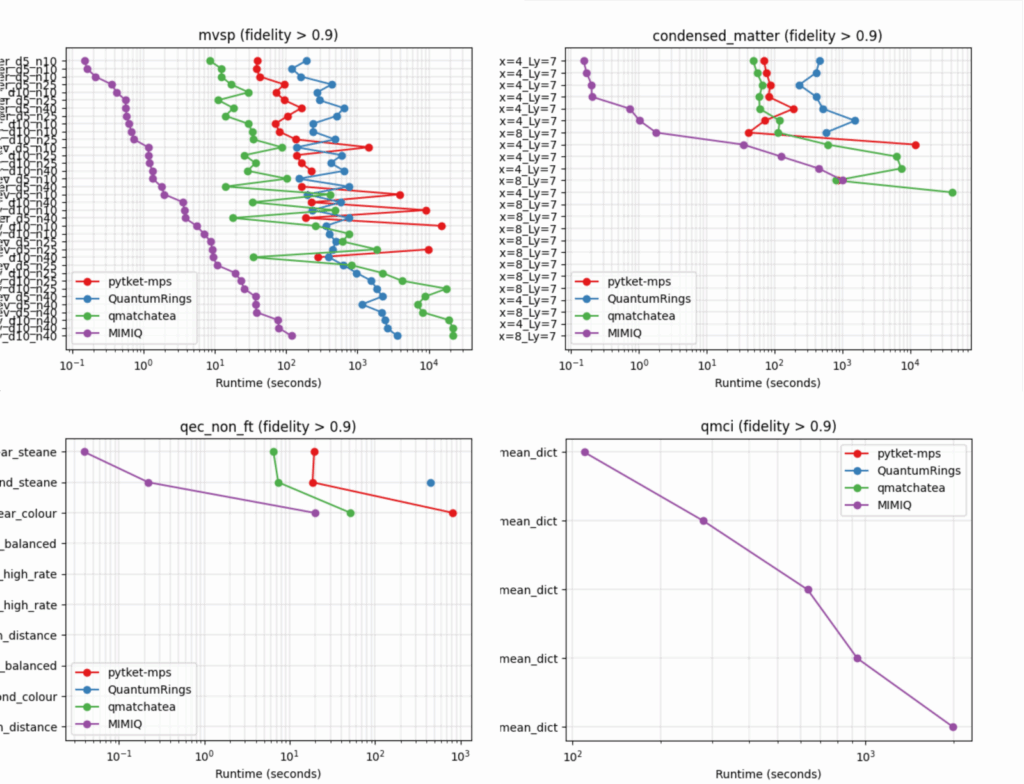
Figure 1. Runtime results for the four emulators running each of the circuits in the following categories: mvsp (Multivariate State Preparation), condensed_matter (Hamiltonian Simulation), qec_non_ft (Quantum Error Correction), and qmci (Quantum Monte Carlo Integration). A fidelity of at least 0.9 was requested in this set.
MIMIQ’s secret
You might be wondering why MIMIQ performs so well. All we can say is that we spent over two years optimizing MIMIQ to achieve this kind of performance, including these five key areas:
- Low-level CPU implementation: We have squeezed every microsecond we could think of by optimizing memory usage, number of operations, and parallelization, and have even rewritten our own optimized tensor network libraries. Every microsecond counts.
- MPS methods: Benefiting from our decade-long expertise in MPS methods, we have implemented the best and most versatile methods that we know for (MPO) compressing and applying gates to the MPS state.
- Circuit pre-optimization: We have developed several functions that compress and transform the circuit, and adapt it to the MPS method used, reducing necessary resources before the circuit is even run.
- MPS parameter optimization: Unlike statevector simulators, the performance of MPS can sensitively depend on various parameters and we have developed methods and intuition to optimize them to the particular use case.
- User expertise: Our extensive use of MIMIQ has taught us how to best apply it depending on the problem. This allows us to optimize performance and find new shortcuts. A good tool is best when you know how to use it, and there is no substitute for experience.
If our recent benchmarking paper, and the results of Quantinuum’s benchmarking challenge aren’t enough to convince you of MIMIQ’s value, then contact us and we’ll test MIMIQ on your application.
What’s next?
At QPerfect we’re obsessed with improving MIMIQ, and this challenge from Quantinuum gave us a chance to keep pushing the limits of simulation. Among other things, we have learned a couple of new tricks to optimize circuits for MPS and we are implementing application-specific libraries and optimizations for chemistry and condensed matter circuits. And even though our CPU implementation prevailed, we are developing our own GPU implementation too.
We are currently working hard to ensure that MIMIQ clients benefit from these new features as soon as possible. Stay tuned!
About QPerfect
QPerfect, a pioneering quantum computing start-up based in France, is driving advancements that accelerate the development of fault-tolerant quantum computing. The company is at the forefront of designing, simulating, and optimizing quantum computers through its innovative hardware and software solutions. QPerfect’s virtual quantum computer, MIMIQ, is revolutionizing the field by enabling large-scale simulations of quantum computing systems. Capable of executing quantum algorithms on up to thousands of physical qubits, MIMIQ sets a new benchmark in the industry. Building upon MIMIQ, and with a specific focus on neutral atom quantum computers, QPerfect is developing comprehensive software and hardware solutions. These solutions aim to provide end users with quantum computing services and propel quantum computers towards fault-tolerance.
Explore how QPerfect is leading us towards the revolution of fault-tolerant quantum computing at www.qperfect.io and follow us on LinkedIn.

